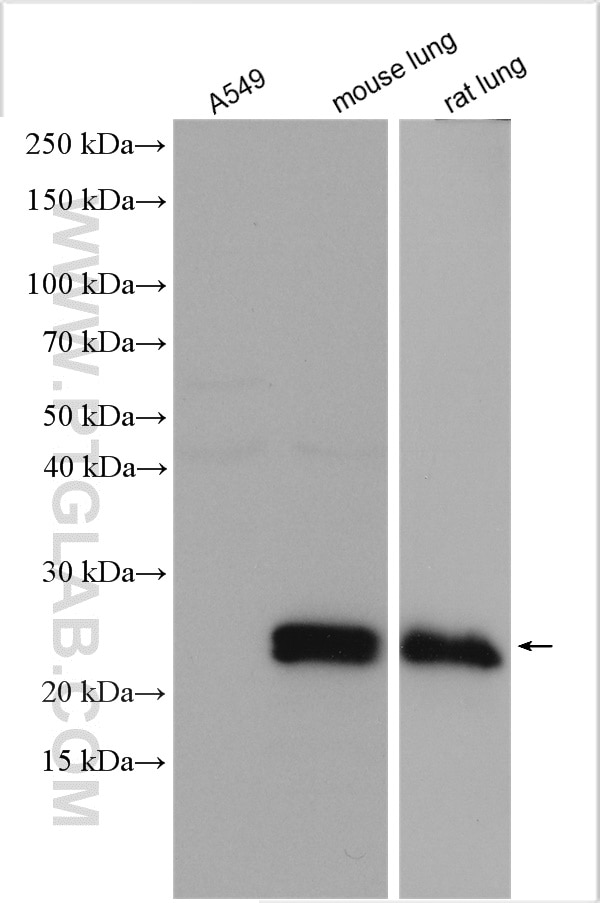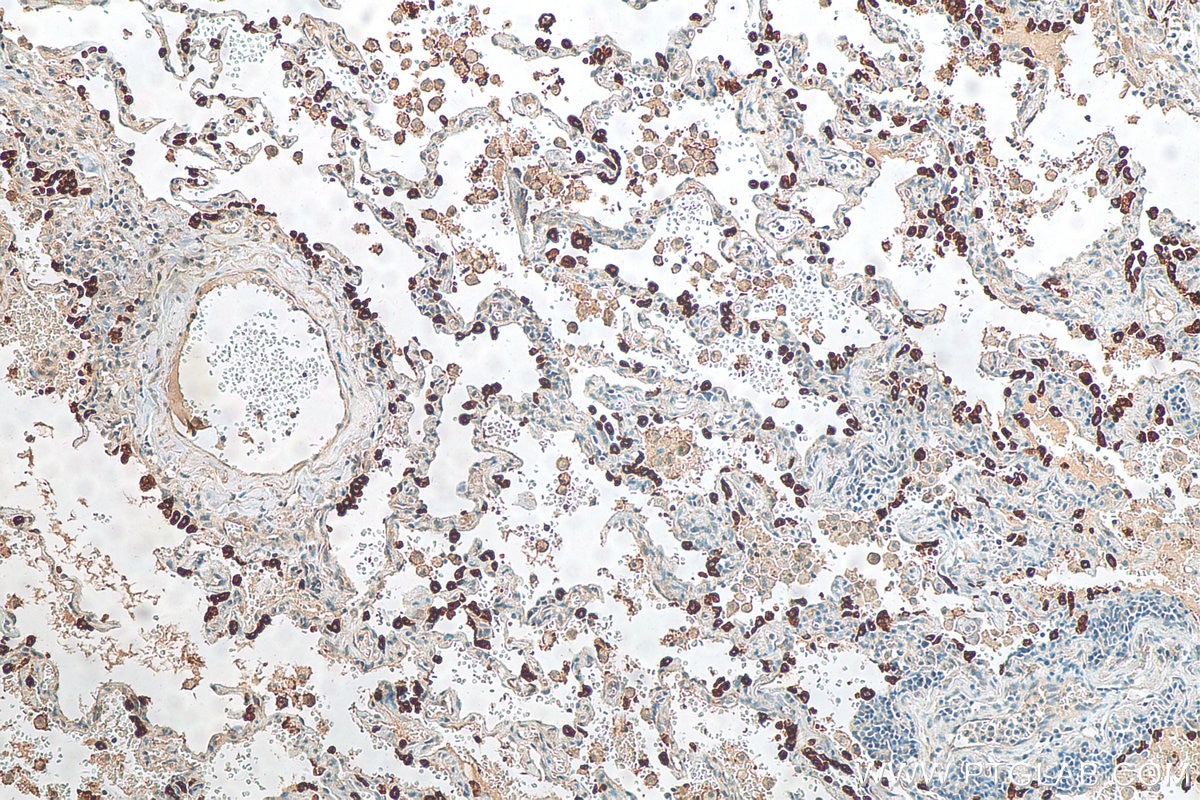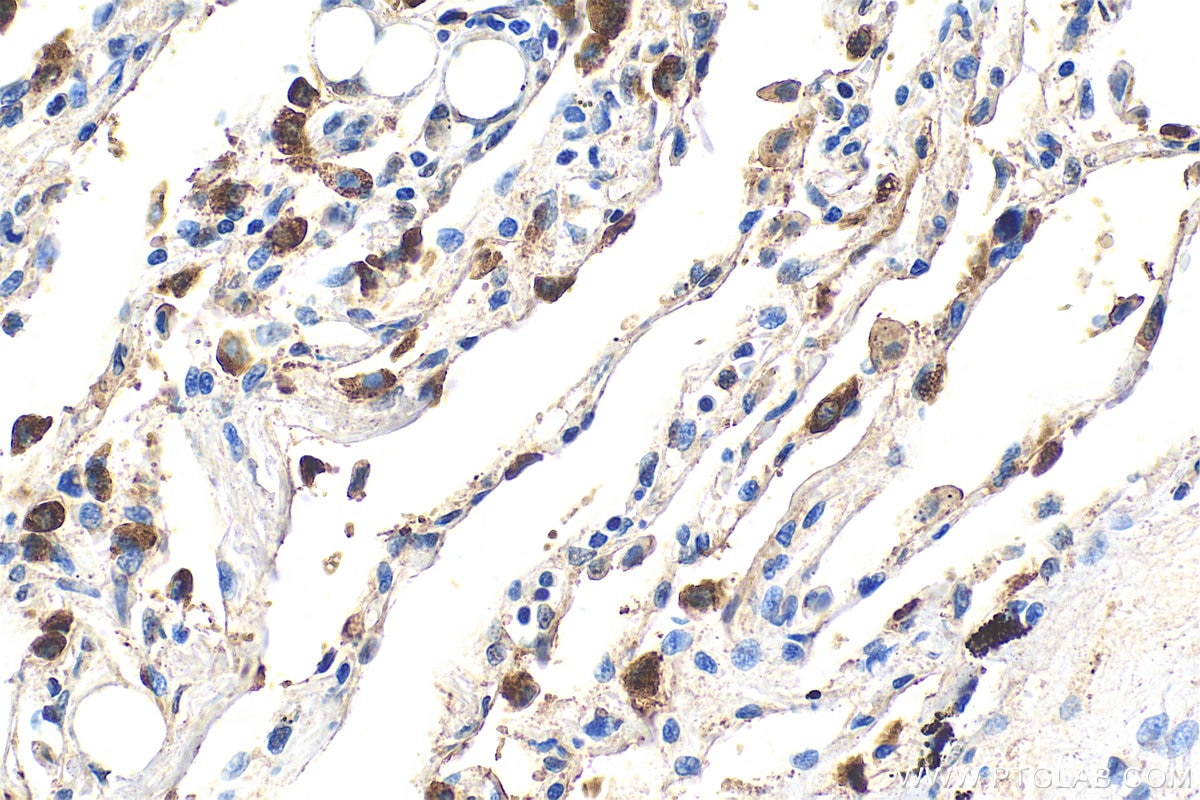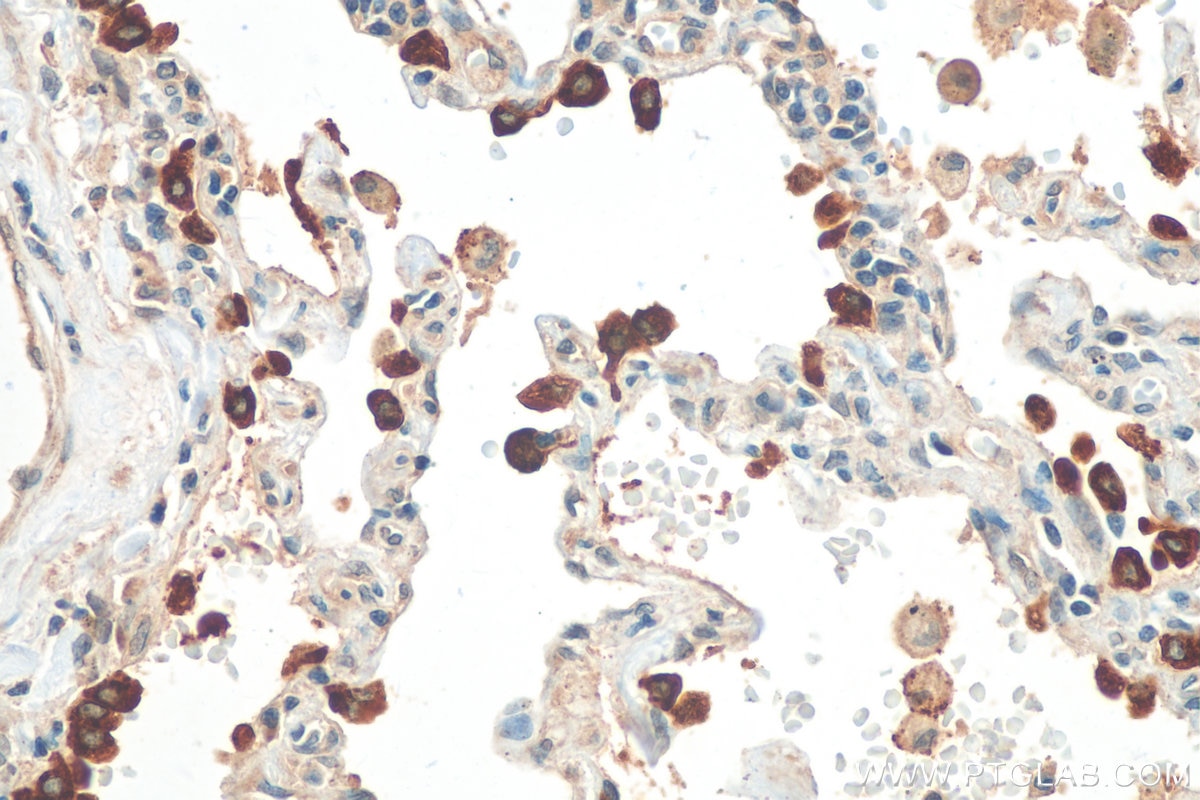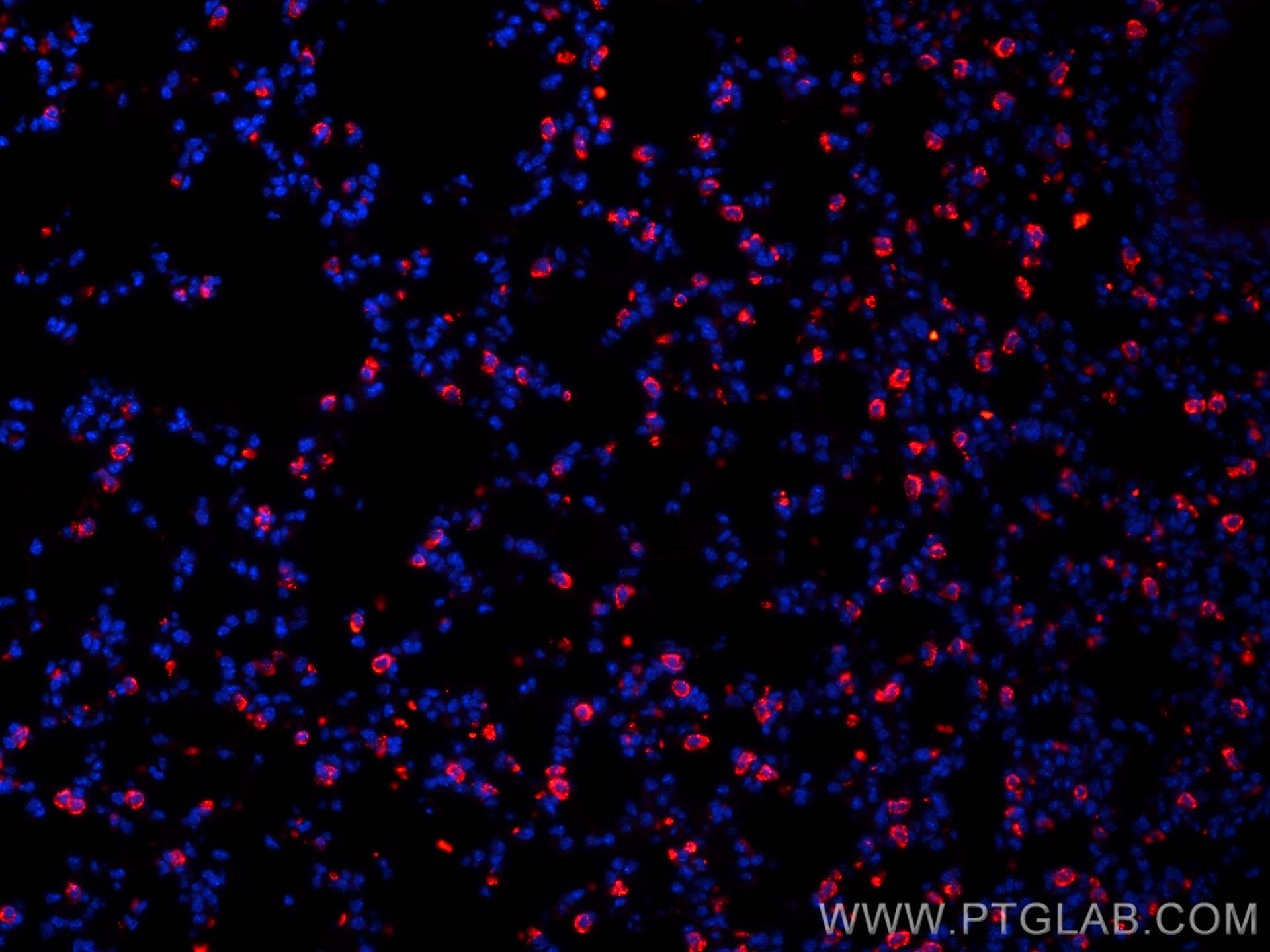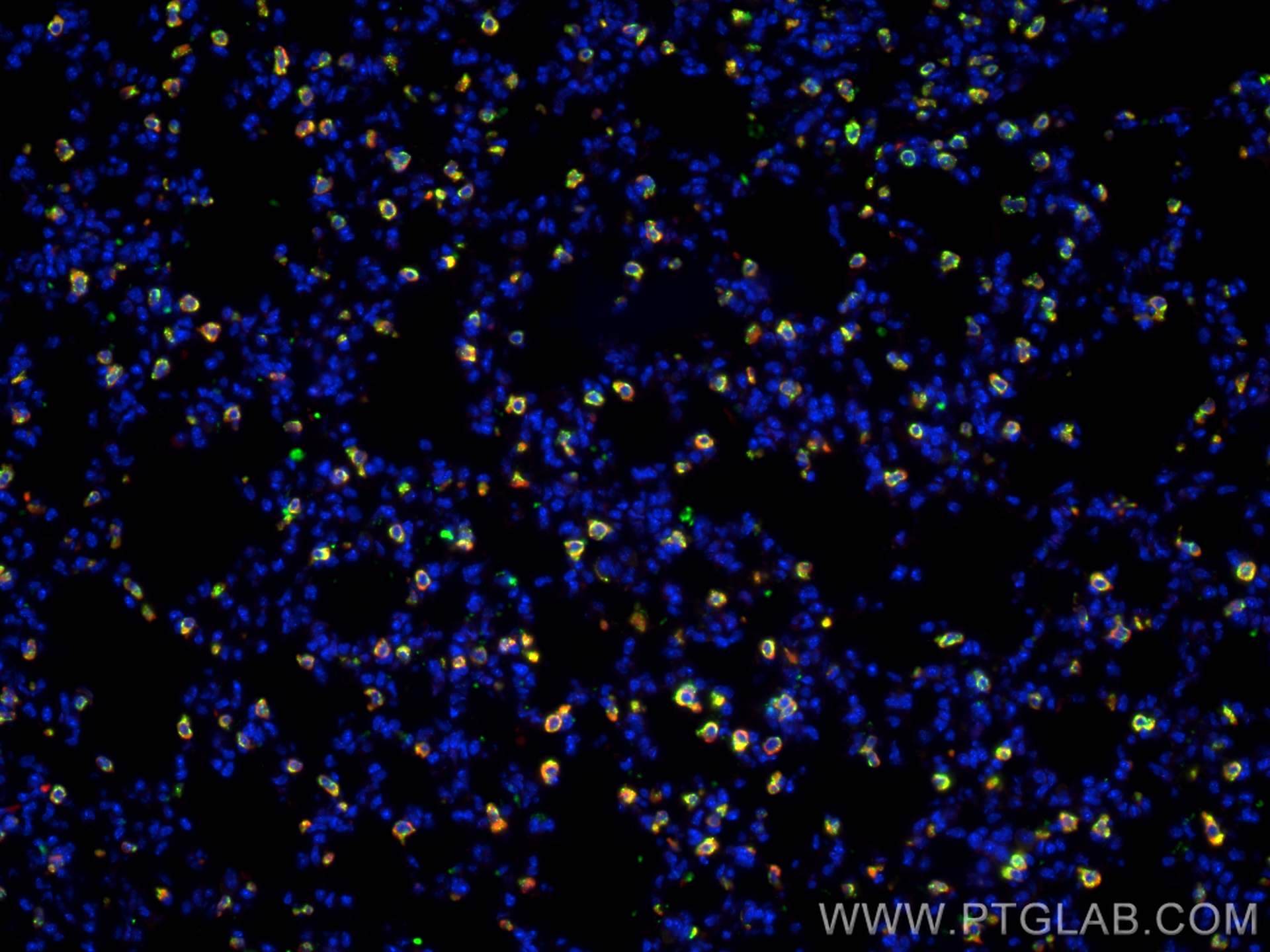SFTPC Polyklonaler Antikörper
SFTPC Polyklonal Antikörper für WB, IHC, IF-P, ELISA
Wirt / Isotyp
Kaninchen / IgG
Getestete Reaktivität
human, Maus, Ratte und mehr (1)
Anwendung
WB, IHC, IF-P, ELISA
Konjugation
Unkonjugiert
Kat-Nr. : 10774-1-AP
Synonyme
Geprüfte Anwendungen
| Erfolgreiche Detektion in WB | Mauslungengewebe, Rattenlungengewebe |
| Erfolgreiche Detektion in IHC | humanes Lungengewebe Hinweis: Antigendemaskierung mit TE-Puffer pH 9,0 empfohlen. (*) Wahlweise kann die Antigendemaskierung auch mit Citratpuffer pH 6,0 erfolgen. |
| Erfolgreiche Detektion in IF-P | Mauslungengewebe |
Empfohlene Verdünnung
| Anwendung | Verdünnung |
|---|---|
| Western Blot (WB) | WB : 1:500-1:2000 |
| Immunhistochemie (IHC) | IHC : 1:500-1:2000 |
| Immunfluoreszenz (IF)-P | IF-P : 1:50-1:500 |
| It is recommended that this reagent should be titrated in each testing system to obtain optimal results. | |
| Sample-dependent, check data in validation data gallery | |
Veröffentlichte Anwendungen
| WB | See 28 publications below |
| IHC | See 10 publications below |
| IF | See 38 publications below |
Produktinformation
10774-1-AP bindet in WB, IHC, IF-P, ELISA SFTPC und zeigt Reaktivität mit human, Maus, Ratten
| Getestete Reaktivität | human, Maus, Ratte |
| In Publikationen genannte Reaktivität | human, Hausschwein, Maus, Ratte |
| Wirt / Isotyp | Kaninchen / IgG |
| Klonalität | Polyklonal |
| Typ | Antikörper |
| Immunogen | SFTPC fusion protein Ag1159 |
| Vollständiger Name | surfactant protein C |
| Berechnetes Molekulargewicht | 21 kDa |
| Beobachtetes Molekulargewicht | 21-25 kDa |
| GenBank-Zugangsnummer | BC005913 |
| Gene symbol | SFTPC |
| Gene ID (NCBI) | 6440 |
| Konjugation | Unkonjugiert |
| Form | Liquid |
| Reinigungsmethode | Antigen-Affinitätsreinigung |
| Lagerungspuffer | PBS with 0.02% sodium azide and 50% glycerol |
| Lagerungsbedingungen | Bei -20°C lagern. Nach dem Versand ein Jahr lang stabil Aliquotieren ist bei -20oC Lagerung nicht notwendig. 20ul Größen enthalten 0,1% BSA. |
Hintergrundinformationen
SFTPC (surfactant protein C), also named as SFTP2, SP5 and SP-C, is a pulmonary surfactant associated proteins promote alveolar stability by lowering the surface tension at the air-liquid interface in the peripheral air spaces. Defects in SFTPC are the cause of pulmonary surfactant metabolism dysfunction type 2 (SMDP2). Genetic variations in SFTPC are associated with respiratory distress syndrome in premature infants (RDS). Two isoforms of the human protein are produced by alternative splicing. One previous study reported that SFTPC deletion was observed in NSCLC tissues, implying that SFTPC downregulation might be involved in the progression of lung cancer. (PMID: 35081981, PMID: 31379200)
Protokolle
| PRODUKTSPEZIFISCHE PROTOKOLLE | |
|---|---|
| WB protocol for SFTPC antibody 10774-1-AP | Protokoll herunterladen |
| IHC protocol for SFTPC antibody 10774-1-AP | Protokoll herunterladenl |
| IF protocol for SFTPC antibody 10774-1-AP | Protokoll herunterladen |
| STANDARD-PROTOKOLLE | |
|---|---|
| Klicken Sie hier, um unsere Standardprotokolle anzuzeigen |
Publikationen
| Species | Application | Title |
|---|---|---|
Sci Adv Inhalable SPRAY nanoparticles by modular peptide assemblies reverse alveolar inflammation in lethal Gram-negative bacteria infection | ||
Sci Total Environ Protein lysine acetylation played an important role in NH3-induced AEC2 damage and pulmonary fibrosis in piglets | ||
Oncogene HAO1-mediated oxalate metabolism promotes lung pre-metastatic niche formation by inducing neutrophil extracellular traps. | ||
Int J Mol Sci Kub3 Deficiency Causes Aberrant Late Embryonic Lung Development in Mice by the FGF Signaling Pathway. | ||
J Pathol Overexpression of the SARS-CoV-2 receptor ACE2 is induced by cigarette smoke in bronchial and alveolar epithelia. |
Rezensionen
The reviews below have been submitted by verified Proteintech customers who received an incentive for providing their feedback.
FH David (Verified Customer) (03-29-2022) | ICC on ALIs without antigen retrieval.
|
